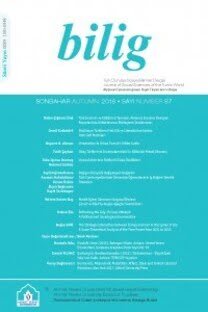Kürt Meselesinde Şiddet Sarmalını Aşmak ve Çözüm Süreci
bilig Overcoming the Cycle of Violence in the Kurdish Problem and the Resolution Proce
___
Abraham, Maslow (1954). Motivation and Personality. Reading: Addison-Wesley Publishing Company.Ağırdır, Bekir (2012). "Kürt Meselesinde Yarın için Yeni bir Dil ve Düşünme Modeli Önerisi". dusunme-modeli-onerisi/3169 (05.03.2012).
Aydın, Mustafa (2001). Barış Çalışmaları ve Çatışmaların Çözümü. Ankara: Avrasya Stratejik Araştırmalar Merkezi Yay.
Akyeşilmen, Nezir (Der.) (2013). Barışı Konuşmak, Teori ve Pratikte Çatışma Yöneti- mi. Ankara: Odtü Yay.
Beriker, Nimet (Der.) (2009). Çatışmadan Uzlaşmaya, Kuramlar Süreçler ve Uygula- malar. İstanbul: İstanbul Bilgi Üniversitesi Yay.
Bayramoğlu, Ali (2012). "Kürt Sorunu Unutulmaya Yüz Tutarken". Yeni şafak Gaze- tesi 18 Şubat 2012.
Botcharova, Olga. "Justice or Forgivenes? In Search of A Solution" http://cojcr.org/vol8no2/623-650.pdf (04.03.2012).
Burton, John (1990). Conflict: Resolution and Provention. London: Macmillan Press.
Coser, Lewis A. (1967). Continuities in the Study of Social Conflict. New York: Free Press.
Daniel, J. Christe (1997). "Direct and Structural Violence: The Human Needs The- ory". Peace and Conflict: Journal of Peace Psychology 3 (4).
Funk, Nathan C. (2012). "Peace Paradigm: Five Aproaches to Peace". http://www.mkgandhi.org/nonviolence/peace%20paradigms.htm (05.03.2012)
Galtung, Johan (1967). A Synthetic Approach to Peace Thinking. Oslo: International Peace Research Institute.
Grewal, Baljit Singh (2012). "Johan Galtung. Positive and Negative Peace". http://upeaceap.org/hando_upfiles/FCPC_RM_06_1.pdf (03.04.2012).
Helrnic G, S. Reymond and L. Petersen Rodney (Der.) (2002). Forgiveness and Recon- ciliation: Religion, Public Policy &Conflict Transformation. Philadelp- hia&London: Templetion Foundation Press.
Kök, Havva (2012). "Çatışma Çözüm Yolları ve Demokratik Açılım". Röportaj: Gamze Coşkun, USAK Gündem, 29 Aralık 2009. E.T. 07 Nisan 2012 http://www.usak.org.tr/makale.asp?id=1260 (03.04.2012).
Lederach, John Paul (1997). Building Peace: Sustainable Reconciliation In Divided Societies. Washington DC: United States Institute of Peace.
Miroğlu, Orhan (2012). Silahları Gömmek. İstanbul: Everest Yay.
Övür, Mahmut (2009). "Barışı mı Savaşı mı Besliyoruz?". Sabah Gazetesi. 19 Eylül 2009.
Sandıklı, Atilla ve Kaya Erdem (2012). Çatışma Çözümü ve Türkiyede Kürt Meselesi. İstanbul: Bilge Adamlar Stratejik Araştırmalar Merkezi Yay.
Sandy Leo R., and Ray Perkins Jr. (2012). "The Nature of Peace and Its Implication for Peace Education". http://www.trinstitute.org/ojpcr/4_2natp.pdf (03.04.2012).
Sevimay Devrim (2009). Süreç, Kürt Sorunundan 29 Temmuz Sonrası Tartışmalar. İstanbul: Özgür Yay.
Petersen, Rodney (Der.) (2002). Forgiveness and Reconciliation: Religion, Public Policy & Conflict Transformation. Philadelphia&London: Templetion Foundation Press.
Tov-Yacoov, Bar-Siman (Ed.) (2004). From Conflict Resolution to Reconciliation. Oxford: Oxford University Press.
Yeğen, Mesut (2011). Son Kürt İsyanı. İstanbul: İletişim Yay.
Yayman, Hüseyin (2011). Şark Meselesinden Demokratik Açılıma, Türkiye'nin Kürt Sorunu Hafızası. Ankara: Seta Yay.
http://www.sabah.com.tr/Gundem/2011/11/23/basbakan-erdogan-konusuyor- 410701598106# (04.06 2012).
http://www.radikal.com.tr/Radikal.aspx?aType=RadikalDetayV3&ArticleID=106683 5&Date=18.11.2011&CategoryID=77 (04.07.2012).
http://www.sabah.com.tr/Yazarlar/ovur/2009/09/19/barisi_mi_savasi_mi_besliyoruz (19.08.2009).
www.gandhianpeace.com/quotes.html (06.09.2013).
http://siyaset.milliyet.com.tr/28-yilin-aci-bilancosu-35-bin-300-kisi-teror-kurbani- oldu/siyaset/siyasetdetay/16.08.2012/1581690/default.html (12.08.2012).
http://www.tbmm.gov.tr/komisyon/dilekce/belge/kararlar/karar8.pdf (08.08.2013).
- ISSN: 1301-0549
- Yayın Aralığı: 4
- Başlangıç: 1996
- Yayıncı: Ahmet Yesevi Üniversitesi Mütevelli Heyet Başkanlığı
Manaplar ve Kırgız Tarihindeki Rolleri
Osmanlı Devletinde Deliliğin Tarihi: Toptaşı Örneği
Kürt Meselesinde Şiddet Sarmalını Aşmak ve Çözüm Süreci
Türk İşaret Dili'nde Sınıflandırıcılar Üzerine Bir Çalışma
Azerbaycan'da Okutulan Tarih Ders Kitaplarında Stalin ve Uygulamalarına Yaklaşım
Öz Liderlik Ölçeğinin Türkçeye Uyarlanması Çalışması
AKİF TABAK, ÜNSAL SIĞRI, Tolga TÜRKÖZ
Kırsal Alevî Kültüründe Çevre, Mekân ve İnsan Etkileşimi - İki Köy Örneği
Türk Dillerinde Kipsellik ve Kipselliğin Anlambilimsel Haritası
